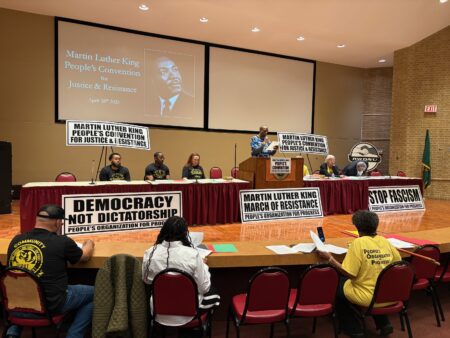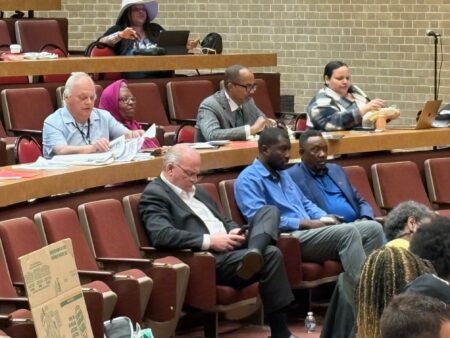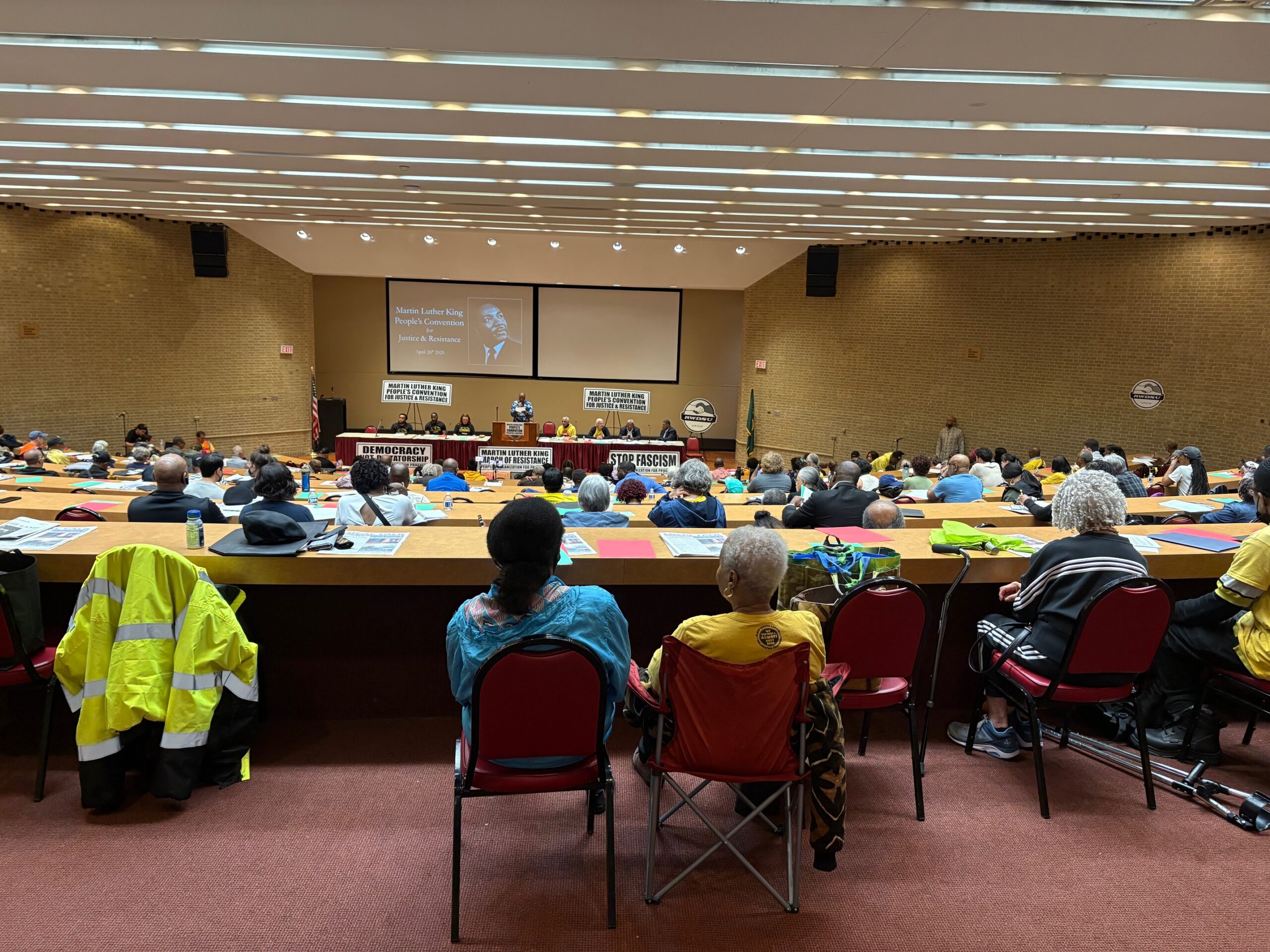By Walter Elliott and Lev D. Zilbermints
Photos By Lev D. Zilbermints
NEWARK – The men and women who gathered at Essex County College’s J. Harry Smith Hall for seven hours Saturday to decide what the Dr. Martin Luther King., Jr. Convention for Justice and Resistance will stand for may well have disproven several statements made by 19th Century general-statesman Otto von Bismark.
Bismark, who used diplomacy and several wars to forge modern Germany from several hundred nation states, once said, “Laws are like sausages; it’s better not to see them being made.”
Laws, however, start off as resolutions to call for action based on spelled out principles – and people have to make them. The 180 people, by “Local Talk” estimate, willingly rolled up their sleeves to pass and/or amend 19 resolutions covering 11 areas affecting daily lives – from Education to Youth.

The resolutions, some having up to 19 bullet points of action items and statements, also covered Environmental, Foreign Affairs and Peace, Health Care and Disability Rights, Housing, Immigration, Labor and Economic Justice, Political Reform and Voting Rights, Social Justice and Veterans. They were represented by committee chairpeople at the Smith podium and with designated tables in the college’s main and Smith Hall lobbies.
“This convention came out of the Dr. Martin Luther King, Jr. Birthday March for Resistance (Jan. 18),” said People’s Organization for Progress Chairman Lawrence Hamm at the convention’s start. “It was the largest Dr. King Birthday turnout we ever had.” (“Local Talk” counted 500 people who walked in that Saturday’s lunch hour drizzle between Essex County’s Dr. King Justice Building and Broad and Market streets’ Four Corners.”)
Hamm, of Montclair, and that march’s organizers announced April 26’s convention to build on that resistance energy. The 11 area committees met weekly to discuss and produce Saturday’s proposals.

“We met every Monday to come up with what we’ve brought before you,” added Hamm. “Some of the proposals were being worked on right up to this morning.”
There was the convention’s program printed in a 49-page draft of proposed resolutions – but that document was closely guarded by committee members and chairpersons. One had to listen to Hamm, as convention president and master of ceremonies, for the subject-to-change lunch period and any other breaks.
Keeping that document close to the chest was because the proposed resolutions were drafts, not to be confused with the to-be-finished product. Hamm, in company with committee heads on the Hall stage dais, said that the resolutions approved here will be put up to the assembled public for final approval at a near future date. One could compare the convention to watching a Polaroid Land Camera photo developing before one’s eyes.
Saturday’s convention may have great consequences given the current climate. President Donald J. Trump and his Make America Great Again allies have conducted a German Army-like blitzkrieg on governmental norms, on due process, on the most marginalized, on international partnerships and the global economic order.
The convention’s 286 sponsoring partners – from 11991 AFSCME to the Young Voters Association – operated on a town hall format.
Committee chairpersons had only three minutes to give their proposed resolutions for the assembly to vote on. Any friendly amendments, questions or objections are made after the resolution is moved and seconded from the assembly floor. Votes were cast by voice or by red or green paper.
“Those who made friendly amendments are to write them down and give them to the person (on the floor) holding a sign,” said Hamm. “We need to incorporate them into the resolutions.”
Charles Hall, President of the Retail, Warehouse and Department Store Union Local 108 AFL-CIO, for example, chaired the Labor and Economic Resolutions introductions. The LER committee’s 10 resolutions included:
- Have Congress restore cuts made by DOGE to the National Institute for Occupational safety and Health and uphold the National Labor Relations Board.
- Provide adequate funding for nursing homes.
- Boost New Jersey’s $15.49 and hour minimum wage to a $35 an hour living wage – and support a national guaranteed income for the poor.
- Defend the Constitutional right to peacefully assemble and protest and pass the Promoting the Right to Organize Act.
- Extend OSHA’s protections to all workers with the Protecting America’s Workers Act.
The Social Justice Committee’s resolutions, coming from 26 of the convention’s organizations, included:
- Have the State Legislature pass the Elder Second Look Act and the New Parole Act.
- Reform the Civilian Committee Review Board on police activity so all participating municipalities and counties have subpoena power.
- Reform the Conviction Review Unit for timely examination and ruling.
- Have the State Legislature pass A602/S3164 and Congress to pass HR 40 that would establish a task force or commission to study and develop proposals for reparations.
The Immigration Committee’s resolutions include:
- Congress calling upon the Executive Branch to adhere to due process as established in the Constitution.
- Gov. Murphy or the next governor sign the Immigrant Trust Act.
- That the State, Newark and Union County reject use of jails for immigration enforcement.
The Environmental Group, chaired by Kim Gaddy of the South Ward Environmental Alliance, put forward:
- No more new fossil fuel projects in the U.S.
- Prevent the Trump Administration from weakening the EPA and National Environmental Policy Act.
- Oppose the PVSC’s “backup” natural gas-powered plant in The Ironbound.
The Foreign Affairs and Peace Committee forward “People’s Agenda for Peace” resolutions including:
- End all foreign military occupation.
- End political interference with African countries.
- Create a nuclear weapons-free zone in the Middle East.
- Have the State Legislature block the adoption of the International Holocaust Remembrance Alliance’s definition of antisemitism and disband the NJ-Israel (trade) Commission.
That committee’s resolution and amendments’ language brought the most protracted consideration, in part on when the suffering of Palestinians began. Just when that fire started was eventually set back to “the early 20th Century” which was adopted after the lunch break.
All resolutions that “Local Talk” witnessed were passed with 19 friendly amendments considered and only one objection.
Saturday’s bottom-up community action contradicted one of Bismark’s other statements: “The great questions of the day will not be settled by means of speeches and majority decisions but by iron and blood.”


